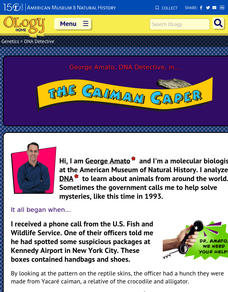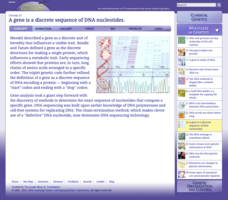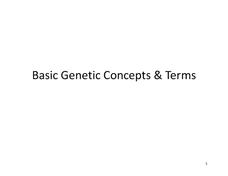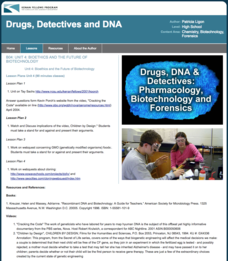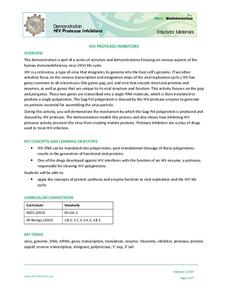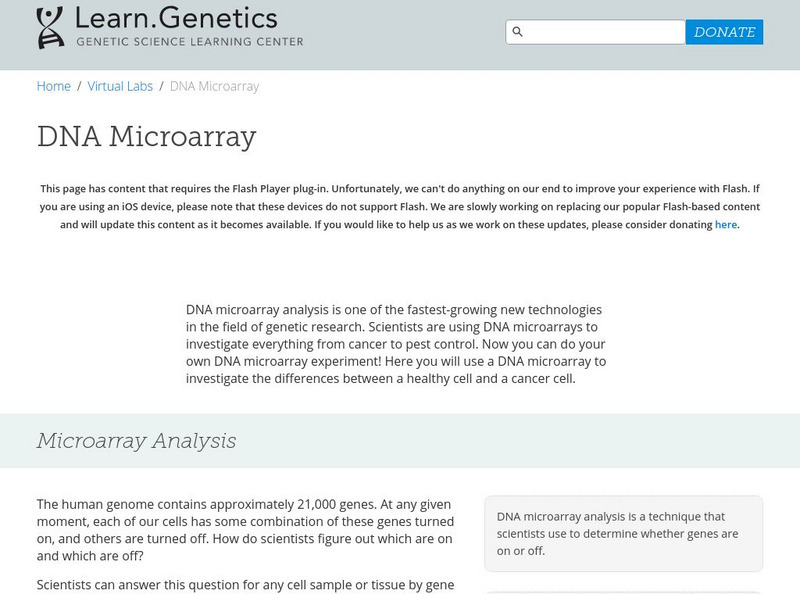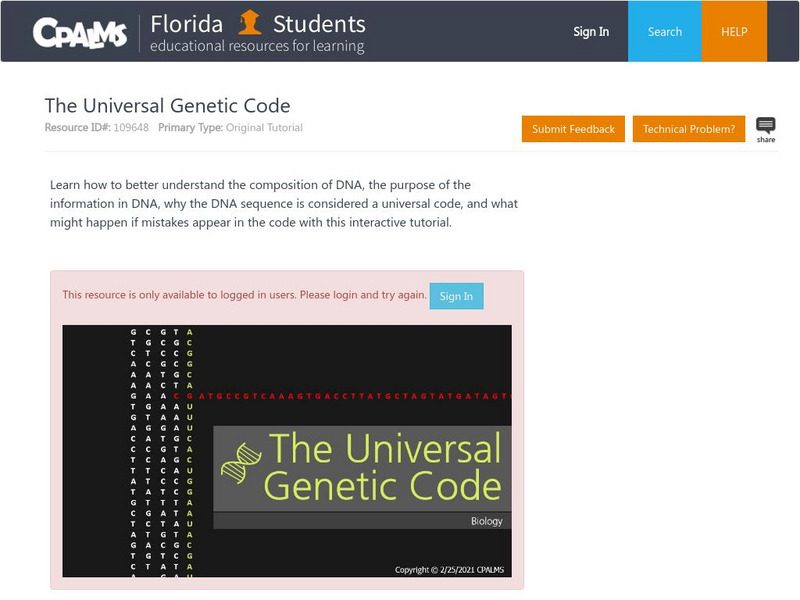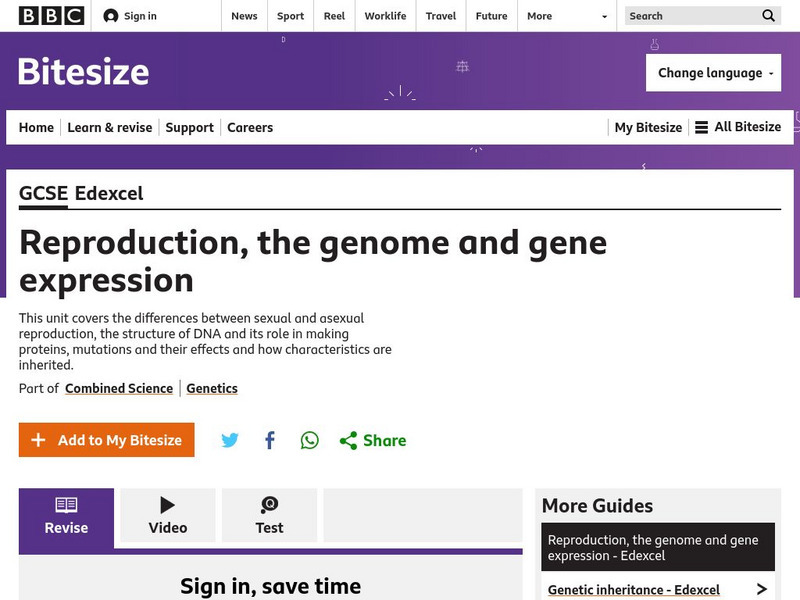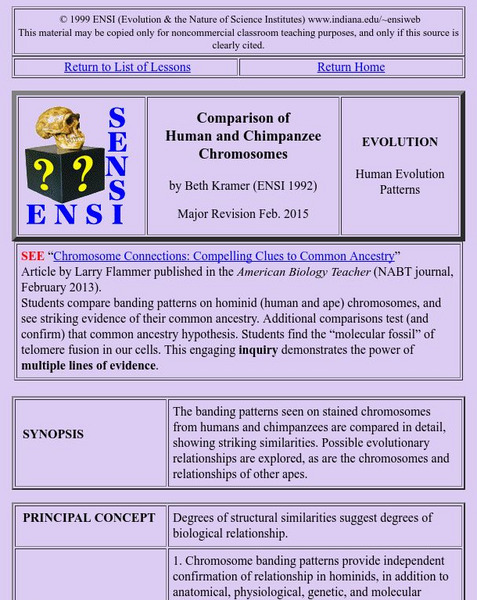American Museum of Natural History
DNA Detective
Match up the DNA code. Pupils read the website from the American Museum of Natural History about how DNA can determine whether a skin is from a particular type of reptile. Using the same technique, learners match up products with the...
Cherokee County Schools
Dragon Genetics
It's alive! Turn young biologists into mad scientists with this engaging genetics activity. Using their knowledge of chromosomes and genes, high schoolers create dragons with unique sets of traits,...
Balanced Assessment
Genetic Codes
Determine the number of possible genetic codes. Class members are challenged to determine the number of possibilities of a genetic code that is 20 bases long. They continue to explore the average lengths of broken RNA molecules.
Cold Spring Harbor Laboratory
DNA Words Are Three Letters Long
DNA writes 64 different words but only codes for 20 different amino acids. Budding scientists learn about where each of these numbers come from and why they aren't equal with an online interactive. The resource explains the research, the...
Cold Spring Harbor Laboratory
A Gene Is a Discrete Sequence of DNA Nucleotides
Frederick Sanger won two Nobel prizes for protein sequencing and DNA sequencing. Young scientists learn about Dr. Sanger's research and amazing discoveries. They read an article and a biography, view videos and animations, and apply...
Cold Spring Harbor Laboratory
RNA Is an Intermediary Between DNA and Protein
For years, scientists believed tRNA was junk left over from larger RNA. Three scientists used different approaches to prove tRNA actually exists as the connection between DNA and protein. Learn about their experiments, their lives, and...
US National Library of Medicine
Basic Genetic Concepts and Terms
Have you ever wondered why you aren't taller or invisible? It all comes down to your dominant and recessive genes. Introduce your class members to genetics with a presentation that includes worksheets for young geneticists to...
Pearson
Transcription
Teach young biologists the language of life with this series of worksheets on DNA. By working through these pages, students expand their understanding of genetics as they learn about the process of transcription and the...
Kenan Fellows
Unit 4: Bioethics and the Future of Biotechnology
What's the future of biotechnology? Explore a hot topic in the fourth and final unit in a series of Biotechnology lessons. Learners develop an understanding of the many issues in bioethics, then create an argument for or against the role...
Howard Hughes Medical Institute
HIV Protease Inhibitors
How do doctors fight a virus that's constantly mutating? Show science scholars how we fight HIV using one of its own most fundamental processes through a thoughtful demonstration. The lesson focuses on how protease inhibitors prevent HIV...
University of Utah
University of Utah: Dna Mircoarray Virtual Lab
This interactive lab will enhance learning about DNA by virtually translating a gene.
PBS
Pbs Learning Media: Journey Into Dna
Travel deep into the human body to see exactly where your DNA resides. From the NOVA: Cracking the Code of Life Web site.
CPALMS
Florida State University Cpalms: Florida Students: The Universal Genetic Code
Explore DNA in this tutorial. Learn about its structure, function, and why it is considered the universal code.
Khan Academy
Khan Academy: Early Experiments on the Genetic Code
Read a passage about early experiments on the genetic code and answer the follow-up questions.
BBC
Bbc: Gcse Bitesize: Reproduction, the Genome and Gene Expression
This lesson focuses on DNA including it's structure,components,and how it goes together to form genomes. It also provides to links to a video and a test.
Indiana University
Ensi: Comparison of Human: Chimpanzee Chromosomes Lesson
This is a great lesson plan that combines Karoytypes and evolution. Students will recognize that the chromosomes of chimpanzees and humans are remarkably similar, then correlate that to their evolutionary relationship.
National Health Museum
Nhm: Amino Acid Sequences Show Evolution
This lesson plan focuses on differences in the amino acid sequence of hemoglobin and myoglobin proteins. They use the number of differences to create a phylogenetic tree.
